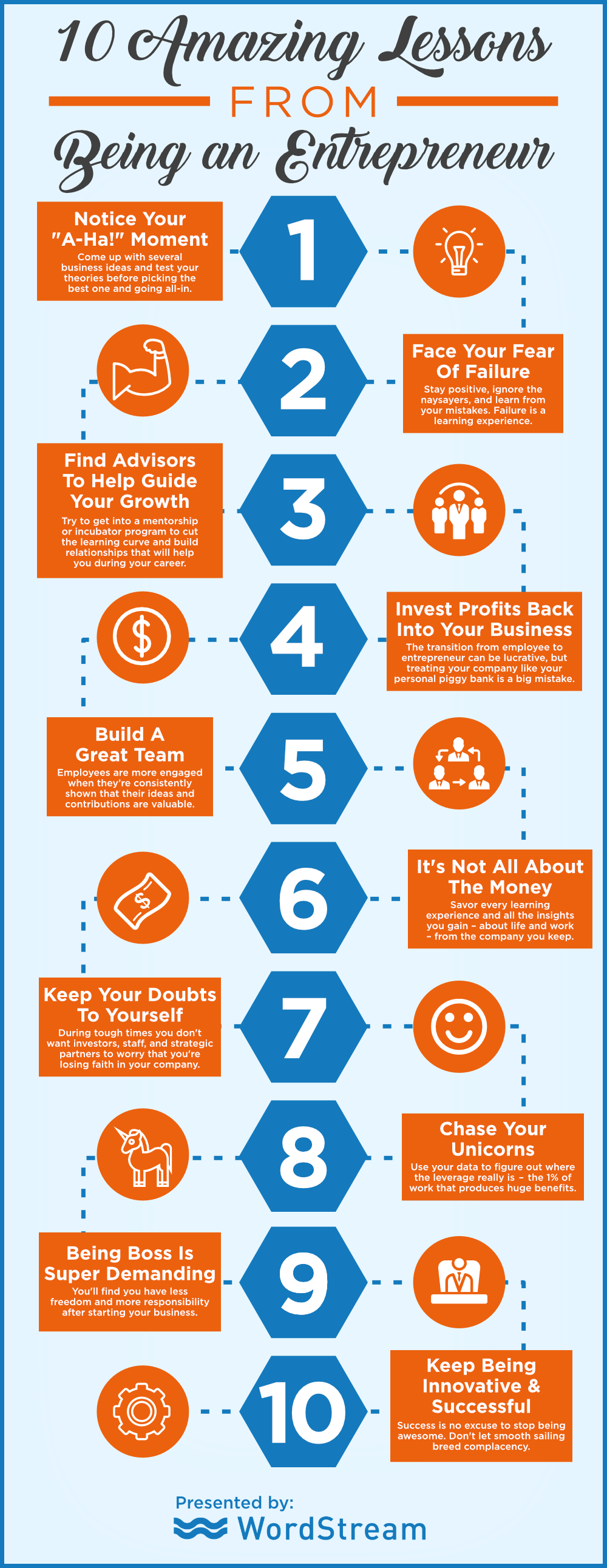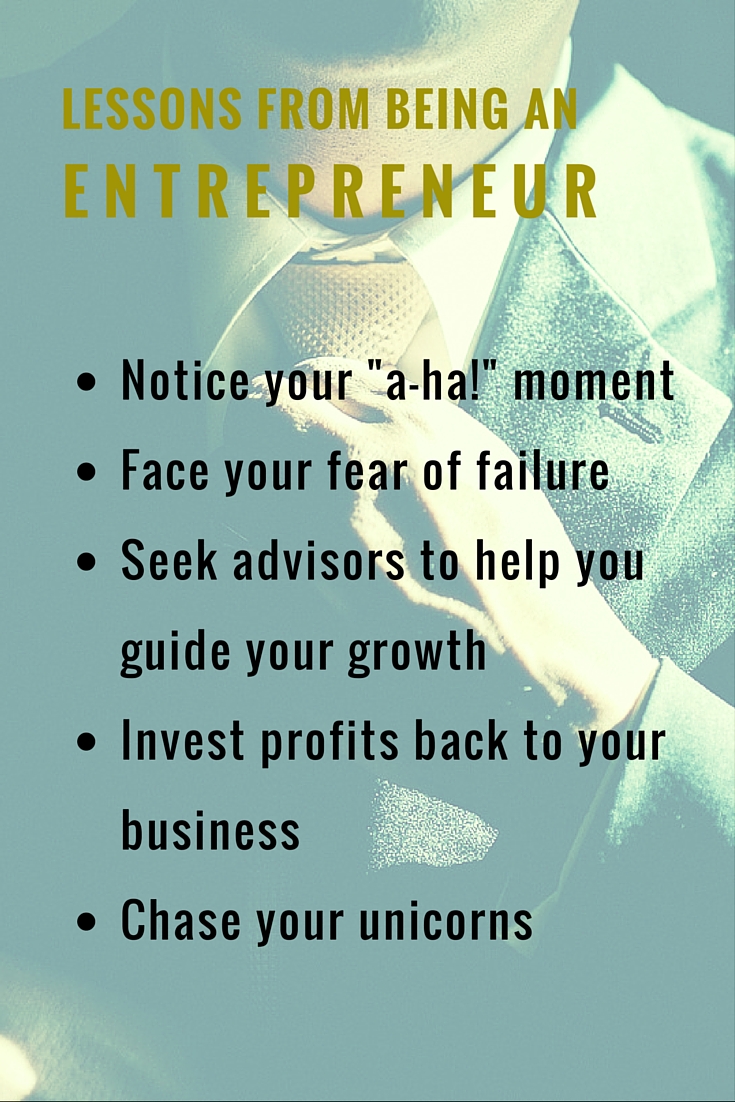My journey as an entrepreneur has been an amazing experience. Here are 10 lessons I’ve learned so far.
Preface: The Search for Something More
Once upon a time, somebody hired you to do a job. You did that job – and did it well.
Successful strategies were developed. Projects were completed on time. Clients were happy with the results. The company was growing and making money. Yet it all somehow felt a bit… incomplete.
Have your smart ideas been ignored or forgotten? Are your passions and skills not being used to their full potential? Are the people running your company lacking the traits needed of true business leaders?
I know that feeling of wanting more.
At one point in my life I felt a pull – almost like some sort of invisible magnet was trying to drag me in a new direction. But where was it pulling me?
The year was 2007. I had yet to start my own award-winning company, WordStream, or have it recognized by Inc. magazine as one of the nation’s fastest-growing private companies for three straight years.
Little did I know my life was about to change in a BIG way.
1. A Call to Action
Every entrepreneur has had an “a-ha!” moment – a moment when an idea crystallizes and everything makes sense. I had such a moment after I developed software to solve a problem.
My marketing consulting tasks were way more time-consuming and repetitive than necessary. Unfortunately, there were no helpful keyword management software solutions on the market.
So I created one. At some point I realized that a lot people would find my PPC automation software valuable. Many small businesses don’t have the time or expertise or budget to succeed at paid search, so my vision was to address this need in the marketplace.
I also realized that the software business was potentially much more valuable than the services businesses.
Once I had both a product and a service to sell, it was time to aggressively pursue the opportunity. I started pitching venture capital investment firms and, eventually, raised a few million dollars.
Lesson: Come up with several business ideas and test your theories before picking the best one and going all-in.
2. Facing Fear of Failure
In life, it’s a lot easier to just fly under the radar and keep your goals and achievements – and any failures to reach those goals – to yourself. Doing so helps you avoid a lot of embarrassment and judgment.
But when you start a business, you need to market it. You must put yourself out there in a very public way.
Something like 80-percent of businesses fail in the first year, so the odds are pretty stacked against you. And sadly, some people actually are hoping to see you fail – including some of your peers.
Lesson: Stay positive, ignore the naysayers, and learn from your mistakes so that things work out better the next time around. Some serial founders start multiple companies and look at each company as a learning experience, not a failure.
3. Seek Advisors to Help Guide Your Growth
Actually starting up and building my own business was shocking a lot of ways. It’s hugely important to have truly great advisors.
My company has had advisors, including Carol Meyers from Rapid7, Chris Litster from Constant Contact, and Janet Holian, the CEO at Gemvara. I’m an advisor to a few Boston-based start-ups including Curata and ThriveHive.
If you get the chance, definitely try to get into a mentorship or incubator program. It’s a great way to cut the learning curve. Plus, on top of the very tangible benefits, you’ll build relationships that will serve you through your entire career.
Also, in marketing, Rand Fishkin has built a big community and been open with his knowledge and experience, so I’ve learned quite a bit from reading everything he publishes and chatting with him at industry events.
Lesson: I think it’s important for every entrepreneur and business to have access to external knowledge and experience to help guide your growth.
4. Invest Profits Back Into Your Business
Your new business needs to eat in order to grow.
In the early days of my business, I fell in love with sole proprietorship; I could deduct legitimate business expenses, command higher rates as a contractor, and take on multiple clients. I paid myself handsomely, bought a new car, and was basically irresponsible with my newfound “wealth”.
In short, I treated my company like my own personal piggy bank. Big mistake.
Eventually, my thinking matured – I paid myself a lower salary and invested profits back into the business. It’s hard to adjust to the mindset that requires that you spend substantial amounts of “your own money” on payroll and marketing, yet it’s necessary in order to bootstrap the business and avoid taking on a lot of seed-level financing.
Lesson: The transition from employee to entrepreneur can be lucrative, yet dangerous, especially if you experience early success. Don’t let an increase in pay (by way of sales) cloud your good judgment and stunt your growth.
5. Team Building
You might start a business to follow your passion – something you’re good at and interested in. But as your business grows, you’ll inevitably find yourself doing less and less of whatever it was you started out doing.
You’ll find yourself focusing more on trying to find people smarter than you are to do a better job than you could have done.
The most important aspect of your job as a company founder is less about doing stuff you love to do and more about building a team.
Also, it’s really important to give employees the training and tools to be great and support them at every level in their efforts to do so. Authenticity and transparency are critical at Wordstream – we expect co-workers to be honest, ethical, and open to two-way communication.
Beyond that, other core values we live each day are “Take Action” and “Win Together”. Our industry moves so quickly that we absolutely have to be able to rely on and support one another. Employees have to be empowered to take calculated risks, even if it means they fall down from time to time.
Lesson: Even the greatest hobby can easily turn into work when it becomes your full-time job and livelihood. Nurture and encourage your team – employees are so much more engaged when they’re consistently shown that their ideas and contributions are valuable.
6. It’s Not All About the Money
Want to make loads of money? Grow and sell a business.
I won’t lie: that was one of my goals.
One thing you should come to terms with is that the vast majority of entrepreneurs won’t get rich quick. You hope it will happen eventually, but make sure you’re in it for the long haul.
So, in pursuit of those loads of riches, a funny thing happened. Building a business created value that wasn’t monetary.
One of the most valuable aspects of starting a business is the social capital and learning experiences you pick up along the journey. The opportunities I’ve had to meet other company founders and discuss crazy business ideas have been invaluable.
Lesson: Though it’s possible that you’ll make tons of money, be sure, along the way, to savor the insights you gain – about life and work – from the company you keep. It will help you put any failures in the proper context.
7. A Disturbing Lack of Faith
Moments of weakness are par for the course for entrepreneurs. At some point when things are extremely rough and the future of your company seems bleak, you might think about throwing in the towel and going to work for a rock star company.
That’s fine. You can think those thoughts all you want.
However, verbalizing your doubts can be an absolute confidence killer in your company. Cash-strapped entrepreneurs need the unwavering support of investors, staff, and strategic partners alike.
Lesson: Transparency is awesome, yes. But you can communicate your funding issues without raising fears that you may be having second thoughts or losing faith. In almost all cases, it’s critical that you keep doubts to yourself.
8. Chase Your Unicorns
Being impatient helps me come up with unusual solutions to stuff. Hacking a system results in ridiculously game-changing outcomes that drive business growth.
Don’t mistake activity for progress – 99-percent of the work people do is chasing after small changes. Instead you should be chasing unicorns.
The unicorn principle follows a power law, that the one-percent is better than all the 99-percent combined, and the top one-percent of the one-percent makes the unicorns look like failures. When you understand how this works, you stop chasing those small things and only go after big gains.
I believe it’s possible for entrepreneurs to predictably create unicorns (as opposed to discovering them by accident). There’s an actual repeatable workflow. That might sound like deciding to hit a hole-in-one, which is ridiculous, but it’s indeed possible!
Lesson: Very little of your effort will actually make a difference. Use your data to figure out where the leverage really is – the one-percent of work that produces huge marketing benefits. With a bit of math and analysis you can do great things.
9. You’re (Sort of) the Boss!
One of the most common reasons for wanting to start a business is to be your own boss. But generally, if you take on investors (as I did), you lose control of the company when you accept the venture capital dollars.
Even if you don’t have to take on investors, your customers become your new boss – and they’re likely to be much more demanding than your old boss ever was!
When you start a business – and especially when you’re in a growth phase – you are accountable to so many people. You need to think about your employees, customers, investors, and partners (internal and external) with every decision you make.
Lesson: There’s actually less freedom and more responsibility involved in starting a business versus having a regular job.
10. Achieving Success
I used to dream about my big idea becoming a reality. However, I greatly underestimated just how awesome it really is to show up at work and watch your dream become a reality as your company grows over time.
It’s impossible to anticipate or describe how great it feels to get your first office, move into a bigger, “real” office, have a company party to celebrate your achievements, be recognized with an industry award, or even just have really happy customers.
Every day, my WordStream co-workers inspire me with all the brilliant work they do to make us the successful company we are today. I am very thankful for having met such fantastic and dedicated people, and for the opportunity to work with them. They inspire me to do more.
Lesson: Success is great, but not an excuse to stop being awesome. Smooth sailing can breed complacency; it’s rarely the best environment for innovation. Now the question is: how can we continue being innovative and successful?
The Big Lesson for Aspiring Entrepreneurs
“Should I start a business?”
It’s a simple question without a simple answer.
Every year, I watch friends, many of them in the marketing industry, think about venturing into the exciting world of entrepreneurship. If you’re thinking about starting your own business – be it as agency, brand, vendor, or publisher – take the time to seriously think about everything touched on in this article. Building a new company from scratch will require a huge commitment of money and time.
Being an entrepreneur is an experience unlike any other. You must relentlessly chase perfection. You need a ridiculous amount of passion. You have to be able to adapt to crazy, unexpected things. And above all, you must provide something incredible to your customers or audience.
Running your own successful business probably won’t turn out exactly how you imagined – but that doesn’t mean it can’t turn out even better than you imagined!


Image credits: Shutterstock





